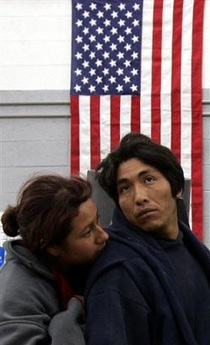 |
 |
 |
 Editorials | May 2006 Editorials | May 2006  
Borders Without Visas
 Tim Cavanaugh - Reason.com Tim Cavanaugh - Reason.com


| | A couple who did not give their names await processing in a U.S. Border Patrol detention center in Nogales, AZ, after crossing the border from Mexico. (AP/Gregory Bull) |
Among the many measures and half-measures that are being proposed to solve the crisis of illegal immigration, there have been some real doozies: a 700-mile wall to keep people out (or in?); a temporary guest-worker program that may end up harming both American and Mexican employees; even a scheme for the largest mass deportation in U.S. history.

But here's one good idea you won't hear about. Let's allow the North American Free Trade Agreement to live up to its promise and permit citizens of Canada, the United States and Mexico to move and work freely among the three countries.

If that sounds crazy, it's only because a century's worth of regulatory corrosion and toxic bureaucracy have made us forget that this is how things used to be. For most of American history, immigration was either open or so lightly regulated that the United States was effectively open to everybody.

A policy of borders without visas would in fact be more restrictive and formal than the system that applied through much of American history because it would depend on proper identification — either a passport or some other recognized papers — to cross from one country into the other.

There are two objections to an open border policy: national security and economics. One is specious; the other is based on ignorance of the way free markets work and free people behave.

First, national security. After the terrorist attacks of Sept. 11, 2001, this line of thinking goes, we cannot afford any laxity at our borders. This case breaks down on logic, facts and history. We already have laxity at both our northern and southern borders. If you believe undocumented immigrants are a security threat, things could not be more dangerous than they are now, because the near-impossibility of entering the United States legally drives thousands of people to cross the border in secret.

Free movement would be more secure than our current system, removing Mexican workers' incentive to swim across the Rio Grande and allowing U.S. Customs and Border Protection to track everybody who's entering the country legitimately, with 100% assurance that anybody who crosses the border in secret is up to no good.

In any event, there is extremely scant evidence, from either current events or history, that the Mexican border presents a military or terrorist threat. The would-be millennium bomber was apprehended entering from Canada, not Mexico. None of the 9/11 hijackers came through Mexico. The United States fought wars throughout the 20th century (including World War I, during which Germany made strenuous efforts to turn Mexico against the U.S.) without having to fear a serious national security threat on its southern border. If opponents think an open border policy would threaten our national security, they need more than vague omens about the number of Shiites active in South America to prove it.

The economic argument — that open immigration would overburden U.S. laws and infrastructure — presumes that all immigrants would settle permanently. In fact, an open borders policy encourages almost as many immigrants to go back home as to stay. Without the risk of being unable to reenter the United States, millions of undocumented workers would be free to return to Mexico.

Again, the argument from history is strong. U.S. immigration authorities in the early 1920s estimated that only half of Mexican immigrants were settling in the country for more than six months at a time. Migrants entered and left as their own circumstances demanded. This pattern held even for European immigrants; roughly one-quarter to one-third eventually returned to their native lands between 1880 and 1920 — a time when transatlantic travel was infinitely harder and more dangerous than it is today.

The reason for this flux is clear. European and Mexican immigration during this era was relatively unregulated. In the period after the 1910 Mexican revolution, the government of Mexico was more likely to try (halfheartedly) to prevent its citizens from leaving than the United States was to prevent them from entering. What changed these patterns was increasing regulation of immigration, which, like most government regulation, ended up aggravating the situation it claimed to address.

And by tying the visa question permanently to the concept of "labor," we even keep out the class we should be attracting: management and entrepreneurs.

The idea of free movement between the United States, Canada and Mexico has a more respectable pedigree than you might think. In a 1979 speech, President Reagan proposed open travel throughout North America. Easier human flow was an implied outcome of the North American Free Trade Agreement, which has been supported enthusiastically by presidents from both parties. It's a sign of debased political discourse that the idea is now considered a nonstarter, if it's considered at all.

Tim Cavanaugh is the Web editor of Reason magazine. Email tcavanaugh@reason.com. | 
 | |
 |



